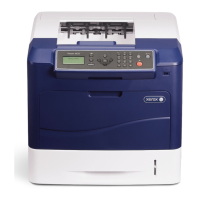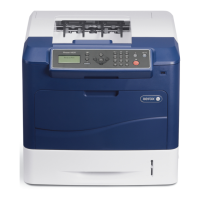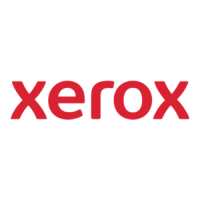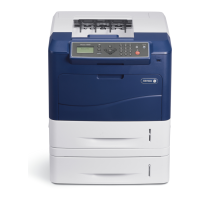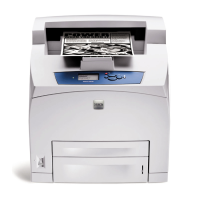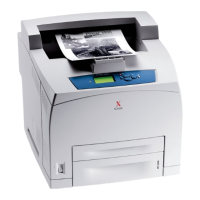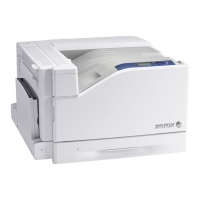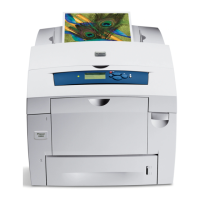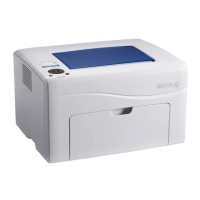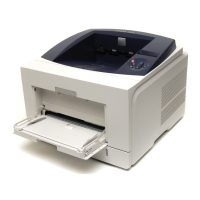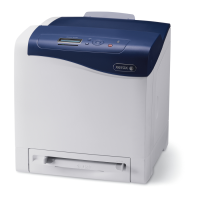Do you have a question about the Xerox Phaser 4620 and is the answer not in the manual?
Explains the manual's structure and purpose, and the organization of its content.
Provides guidance on navigating the manual, understanding model variants, and interpreting warnings.
Details essential safety guidelines, electrical precautions, operational safety, and maintenance safety for service personnel.
Illustrates and explains precautionary symbols found on the machine for hazard identification.
Outlines voltage specifications and methods for DC voltage measurement in RAPs.
Defines procedures for reporting and resolving health and safety incidents.
Covers compliance with FCC and Canadian regulations for emissions and interference.
Provides safety warnings translated into multiple languages for broader understanding.
Details the CE mark declaration of conformity with applicable European Union directives.
Provides a general description of the printer's capabilities, options, and major system assemblies.
Lists and describes available options like feeders, duplex unit, and memory upgrades.
Details the finisher's functionality, including stapling, stacking, and hole punching.
Explains the functions of each button and the display elements on the printer's control panel.
Lists routine maintenance items and their rated life expectancy, including consumables.
Outlines initial steps for service technicians to gather information and identify the reported problem.
Details actions specific to the first service call, including configuration checks.
Describes procedures for determining the reason for a service call with a fault message.
Guides technicians on identifying faults using codes and troubleshooting image defects.
Provides information on maintaining and inspecting components like rollers, gears, and belts.
Details steps to evaluate system operation, perform final checks, and ensure cleanliness.
Lists and describes the various configurations and options available for the printer.
A guide to identifying the source and type of imaging defects.
Lists common image defects and the RAPs used for their correction.
Describes test patterns used to identify image quality issues like density and registration.
Provides specifications for evaluating solid area density, skew, registration, and image area.
Covers diagnostics, fault history, system settings, firmware upgrades, and component control.
Details ESD prevention, machine specs, installation, and environmental data.
Provides precautions for safely disassembling, reassembling, and lubricating components.
Guides on how to check motors, sensors, switches, and solenoids/clutches.
Wiring diagrams for the IOT, IP Board, MCU Board, Joint Board, and SMPS connections.
Wiring diagrams for the Laser Unit, HVPS, and SMPS components of the printer.
Wiring diagrams for 520-Sheet Feeder, 2000-Sheet Feeder, Mailbox, and Finisher system connections.
Describes the printer's overall operation, xerographic process, and major system assemblies.
Explains how media is transported through the printer's input and output paths and sensors.
Details the types of sensors used for paper tracking, jam detection, and condition monitoring.
Explains the xerographic process, including Drum Cartridge, Transfer Roller, and Laser Unit functions.
Describes the operation and components of Trays, Feeders, Mailbox, and Finisher.
| Operating temperature (T-T) | 50 - 90 °F |
|---|---|
| Operating relative humidity (H-H) | 20 - 80 % |
| Color | No |
| I/O ports | 10/100/1000 BaseT Ethernet, USB 2.0 |
| Depth (min) | 541 mm |
| Height (min) | 420 mm |
| Minimum width | 476 mm |
| Minimum weight | 34.6 kg |
| Package length | 698.49 mm |
| Print technology | Laser printing |
| Mac compatibility | Yes |
| Security features | Audit log, HTTPS, Image overwrite security, IP filtering, IPSec, Network authentication, SNMPv3, 802.1x |
| Storage drive type | Optional |
| Print memory (standard) | 256 MB |
| Power consumption (active) | 900 W |
| Minimum storage drive space | 160 GB |
| Power consumption (standby) | 93 W |
| Power consumption (PowerSave) | 10 W |
| Storage media | HDD |
| Maximum internal memory | 768 MB |
| Sound power level (standby) | 39 dB |
| PCL fonts | 93 |
| Certification | Class 1 Laser Product, CE Marked, EMC Directive 89/336/EEC, EN 55022 Class B, EN 55024, FCC Part 15, Class B, Low Voltage Directive 73/23/EEC, RoHS Directive 2002/95/EC |
| Country of origin | China |
| Maximum duty cycle | 275000 pages per month |
| Number of PostScript fonts | 136 |
| Number of print cartridges | 1 |
| Total input capacity | 550 sheets |
| Total output capacity | 500 sheets |
| Maximum input capacity | 2000 sheets |
| Multi-Purpose tray input capacity | 100 sheets |
| Maximum resolution | 1200 x 1200 DPI |
| Time to first page (black, normal) | 7.8 s |
| Print speed (black, normal quality, A4/US Letter) | 65 ppm |
| Display | LCD |
| Package weight | 40200 g |
| Maximum print size | 216 x 356 mm |
| Paper tray media types | Bond paper, Card stock, Labels, Pre-Printed, Recycled paper, Transparencies |
| ISO A-series sizes (A0...A9) | A4 |
| Standard interfaces | USB 2.0 |
| USB 2.0 ports quantity | USB 2.0 ports have a data transmission speed of 480 Mbps, and are backwards compatible with USB 1.1 ports. You can connect all kinds of peripheral devices to them. |
| Export Control Classification Number (ECCN) | EAR99 |
| Width | 627.37 mm |
|---|---|
| Height | 685.79 mm |
| Dimensions (WxDxH) | 476 x 420 x 541 mm |
